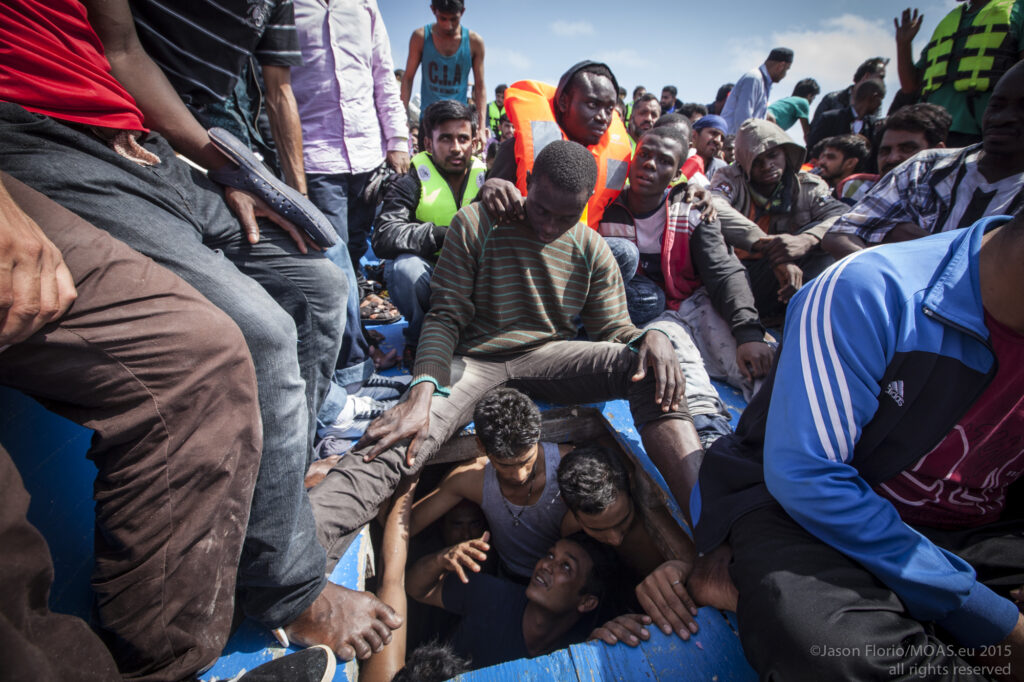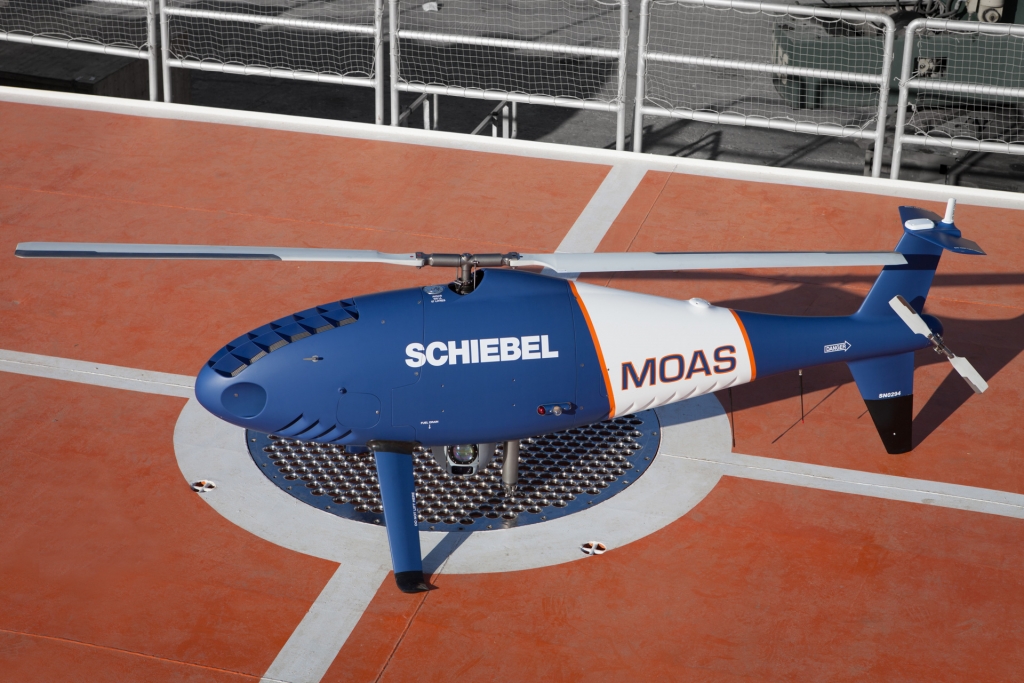Since launching exactly a year ago, Migrant Offshore Aid Station (MOAS) has significantly contributed to saving lives during one of the worst maritime refugee crises the world has ever seen while inspiring others to take action.
More than 10,000 men, women and children in distress have been rescued at sea by Migrant Offshore Aid Station (MOAS), as Europe’s first privately funded search and rescue marks one year from its first rescue on August 30th.
Up to 200 people died on Thursday 27 August, when a boat bound for Italy sank off the Libyan coast. On the same day, more than 70 bodies were discovered by Austrian authorities in an abandoned lorry on a motorway at the border with Hungary.
These are just the latest awful figures of the unending refugee crises at Europe’s borders.
The reality is stark. More than 2,500 alone died at sea this year, an all-time record. As many as 20,000 people may have lost their lives in the at sea trying to reach Europe’ shores on unsafe boats.
MOAS has been on the frontline of the Mediterranean migrant crisis since 2014 as the first search and rescue NGO of its kind. Conceived before and launched immediately after the Italian-funded operation Mare Nostrum in October 2013, MOAS has since collaborated with all the vessels at sea and under the coordination of the relevant Maritime Rescue Coordination Centre (MRCC). To date this has been the Rome MRCC operated by the Italian coastguard.
MOAS is proud to see that its efforts have inspired other non-governmental and civic organizations – like Medecins Sans Frontieres and Sea Watch – to offer their own vessels to the cause. This is a great example of civil society responding to a global problem.
An international NGO with operational base in Malta, MOAS is equipped with the a 40-metre vessel – M.Y. Phoenix – two Schiebel camcopters, two rescue RHIBs, and a 20-strong professional crew of seafarers, rescuers, doctors and paramedics. MOAS set sail on May 2nd 2015, after saving some 3,000 lives in 60 days last year. This year MOAS has partnered with Medecins Sans Frontieres which is responsible for post-rescue care on board.
Alleviating human suffering and death at Europe’s doorstep
The people rescued and assisted by MOAS in the Mediterranean sea are mostly refugees from Eritrea, Nigeria, Syria, Somalia, Sudan.
According to the UN, the overwhelming majority of people arriving by boat to Europe are escaping war, violence, persecution. A smaller number is escaping the sort of poverty that drives some to desperation. This has led UNHCR to conclude that the Mediterranean migration crisis is in fact a refugee crisis.
From the data and testimonies MOAS has collected onboard the Phoenix, it is clear that all that undertake the dangerous crossing are compelled to do so. The majority say they have no option but to seek protection from conflicts, extremist groups, repressive regimes in any way possible.
Since it set sail, the MOAS crew has assisted numerous severely overcrowded boats in distress off the coast of Libya crammed with desperate people. These include victims of violence and trafficking, pregnant women – often travelling alone -, unaccompanied children, young men fleeing forced labour, indefinite military service and extreme deprivation.
Call for continued collective action
As thousands more continue to pile into rickety, overcrowded boats, MOAS’s presence at sea becomes more important. We need to conduct search and rescue and prevent vulnerable people from dying trying to reach safety in Europe.
Following the shipwreck of April 2015, when about 800 people lost their life, MOAS has welcomed the decision by the EU to strengthen the search and rescue efforts by tripling the fund for Frontex and expanding its mandate.
MOAS is also pleased to have paved the way to an increase in the involvement of other independent entities as well as EU member states in mitigating further loss of life at sea. As a result of this collaboration between state-run and private search and rescue efforts, the number of people dying dropped significantly during the months of May and June.
However, the latest tragedies clearly show that the assets at sea and the efforts to save people are not enough and the maritime humanitarian crisis is far from being over.
Between July and August 2015, more than 700 people died when their boat capsized off the Libyan coast and some died from asphyxia being trapped in the lower deck. This is a ghastly reminder that people are still willing to travel on inhumane conditions and risk their lives in order to reach safety.
As long as thousands of human beings feel they have no other option other than embarking on a dangerous crossing, MOAS urges decision makers to put SAR at the top of their agendas. A collective humanitarian action at sea – by governments, NGOs, private initiatives – continues to be vital.
Humanitarian Innovation
MOAS has been a pioneer in combining humanitarian action with high search and rescue expertise and technology. The team is composed of a diverse and international like minded group of humanitarians, ex-military personnel, specialized search and rescue operators, mariners, paramedics and volunteers who all believe that nobody deserves to die at sea.
The use of latest generation technology has been instrumental in minimizing the risk of death for thousands of vulnerable people. Drones or Unmanned Aerial Vehicles (Schiebel Camcopter S-100) allow for informed decision, they are able to provide real time visuals of vessels of interest. From miles away MOAS is able to know the size and condition of the boat, the number of people on the boat and the precise sea state.
Thanks to drones’ images MOAS have also been able to assist the Italian coastguards locate boats in distress and speed up the rescue operations.
MOAS has had a remarkably successful track record in addressing a complex and dangerous humanitarian effort with innovation, speed, and cost-effectiveness. To date, no migrants were injured or drowned during a rescue.
MOAS needs financial support to keep saving lives worldwide
The first privately funded search and rescue NGO in the Mediterranean, MOAS, was the brainchild of American philanthropists Christopher Catrambone and his wife Regina Catrambone, who have invested more than €8 million in the project.
The 2014 mission was a proof of concept. In 60 days last year, MOAS rescued 3,000 migrants, mostly Syrian refugees. Since proving its capabilities, MOAS has received a huge amount of support from people all over the world who have refused to sit back and watch desperate people drown.
MOAS has received direct financial support from Doctors Without Borders (MSF). This partnership has not only enhanced the post rescue assistance given to those we save but has also contributed to ensure that the Phoenix is out at sea saving lives.
Public support for MOAS has also shot up in these past months, with almost €1.5 million raised within a few weeks. The biggest single donation to MOAS came from drone operator Schiebel that will be providing two drones and personnel for free for the months of September and October, worth €600,000.
Meanwhile, the Avaaz.org community has raised an additional €500,000 following an online appeal to its large member database. Thousands around the world have responded to their appeal demonstrating once more Avaaz’s resolve and ability to act in support of worthy causes.
A fundraising activity in Germany also helped raised an additional €250,000 thanks to the efforts of the Archdiocese of Cologne, Caritas and committed humanitarian Rupert Neudeck.
Support has also come from individual philanthropist who just like the Catrambones does not want to remain bystanders whilst this tragedy unfurls. Mr Jurgen Wagentrotz, a German national himself once a refugee will be donating Eur 180,000 by the end of October. This figure will be matched by Oil and Gas Invest, the company he chairs.
The world is facing the worst refugee crisis since World War II: 60 million people worldwide are forcibly displaced. This is not only a European problem; this is a complex and global issue that requires a global solution. MOAS calls for governments, civil society organizations and private citizens to work together to put an end to the humanitarian catastrophe at our doorsteps. Collective action can save lives.
MOAS will be operating in the Mediterranean till the end of October. Its plan to make the humanitarian operation sustainable year-long and to expand it on global scale depends exclusively on funding.








